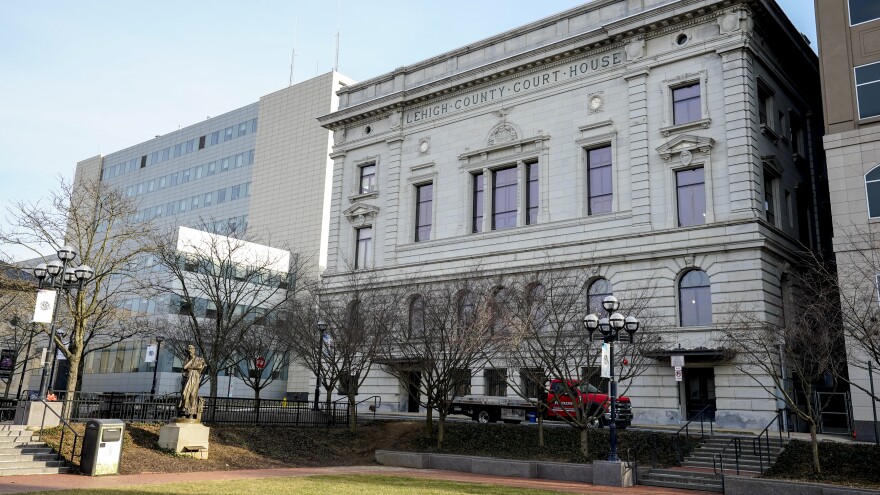ALLENTOWN, Pa. — An Allentown landlord can move forward with his lawsuit that alleges a homeless encampment is devaluing his neighboring properties.
Nat Hyman’s complaint alleging Allentown officials' inaction in Jordan Meadows is hurting his bottom line was the subject of Lehigh County Judge Douglas Reichley's July 23 ruling that rejected many of the city's objections.
People are living in more than a dozen tents set up in the wooded areas behind Hyman’s properties along Jordan Creek near Tilghman Street, according to the suit, filed in April.
Those tents “make [Hyman’s] properties less attractive and less valuable due to their proximity to the homeless community,” the suit alleges.
People often trespass on Hyman’s properties — which include Meadow Place and Allen Flats — where they sometimes urinate, defecate and illegally connect to water and utilities, the developer’s suit states.
Hyman said he sued after unsuccessfully trying multiple times to have officials resolve the “unsightly, unsanitary and dangerous conditions” on the city’s properties.
Their refusal to address those issues is “effectively permitting the use of the Jordan Park Greenway properties … by unidentified homeless individuals,” the lawsuit alleges.
Reichley sustained some parts of the objections filed in June by city deputy solicitor Adam Rosenthal, but rejected many of the city’s arguments to have the suit dismissed.
Hyman and his attorney, James Scanlon, have until mid-August to amend their complaint against the city to address upheld objections.
The city in response to Hyman’s nuisance complaint argued the landlord lacks standing to sue the city and did not provide enough specifics to pursue litigation.
First legal challenge
The lawsuit is the first legal challenge to Mayor Matt Tuerk’s directive to clean rather than clear homeless encampments.
Police until last fall posted no-trespassing signs at encampments and let residents pack up their belongings to relocate before bulldozers cleared sites, a police official told the city’s Commission on Homelessness this spring.
“It’s not really addressing the problem, it’s just brushing it aside. Why just bulldoze somebody’s tent if they have nowhere else to go?”Mayor Matt Tuerk in April
But Tuerk ordered city workers to clean up those areas without moving people out, he said.
“It’s not really addressing the problem, it’s just brushing it aside,” he told LehighValleyNews.com in April. “Why just bulldoze somebody’s tent if they have nowhere else to go?”
Encampment legislation
As the city defends its new approach to homeless encampments in court, lawmakers in Harrisburg are pushing legislation that could make it easier for people living near camps to compel action by local authorities.
Senate Bill 780 would let anyone living or owning property within 1,600 feet of a homeless camp to petition municipalities to declare it a public nuisance.
Local officials would have 90 days to reject the petition or declare a property to be a nuisance.
A nuisance declaration would require the property’s owner to break up the camp or make the owner liable for any dangerous conditions created by the camp.
Petitioners could appeal officials' rejection of a nuisance petition in Commonwealth Court, if the bill — cosponsored by state Sen. Jarrett Coleman, R-Lehigh/Bucks — is approved as proposed.
Coleman said he did not add his name to bill because of Hyman’s lawsuit, but he said it shows the issues the measure tries to address.
"In the end, I voted to advance this bill because I support holding absentee private property owners accountable for unauthorized encampments that impact the quality of life for all residents."State Sen. Lisa Boscola, D-Lehigh/Northampton
The state Senate bill in June approved the bill by a 36-14 vote with bipartisan support.
Sens. Lisa Boscola and Nick Miller, both D-Lehigh/Northampton, joined Coleman in voting to approve the legislation.
Boscola, who tried to amend the bill to apply only to private-property owners, said she voted for the flawed bill with hopes lawmakers in the state House iron out issues for municipalities.
"In the end, I voted to advance this bill because I support holding absentee private property owners accountable for unauthorized encampments that impact the quality of life for all residents," Boscola said last month in an email to LehighValleyNews.com.
'An endless cycle'
Mayor Tuerk said Allentown and other municipalities get stuck in an endless cycle of clearing homeless encampments if the bill is approved.
"They’re not proposing any solution to the actual problem. They are proposing for cities to bulldoze encampments. It doesn’t do anything to address the underlying issues.”Allentown Mayor Matt Tuerk
"They’re not proposing any solution to the actual problem,” he said. “They are proposing for cities to bulldoze encampments. It doesn’t do anything to address the underlying issues.”
An executive order issued last month by President Donald Trump also could make it easier for local officials to clear encampments.
Trump’s order prioritizes federal funding for “states and municipalities that enforce prohibitions on open illicit drug use, urban camping and loitering.”
It also calls for U.S. Attorney General Pam Bondi to end agreements that limit officials’ “ability to commit individuals on the streets who are a risk to themselves and others.”
The order redirects funding to move “individuals camping on streets and causing public disorder” to treatment centers and other facilities.
Critics say the order essentially criminalizes homelessness instead of helping people find housing.


